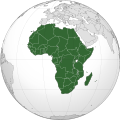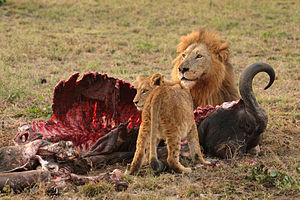Portal:Africa

Africa is the world's second-largest and second-most-populous continent. At about 30.2 million km2 (11.7 million sq mi) including adjacent islands, it covers six percent of the Earth's total surface area and 20.4 percent of the total land area. With 1.1 billion people as of 2013, it accounts for about 15% of the world's human population. The continent is surrounded by the Mediterranean Sea to the north, both the Suez Canal and the Red Sea along the Sinai Peninsula to the northeast, the Indian Ocean to the southeast, and the Atlantic Ocean to the west. The continent includes Madagascar and various archipelagos. It has 54 fully recognized sovereign states ("countries"), nine territories and two de facto independent states with limited or no recognition. Africa's population is the youngest among all the continents; 50% of Africans are 19 years old or younger. Algeria is Africa's largest country by area, and Nigeria is the largest by population. Africa, particularly central Eastern Africa, is widely accepted as the place of origin of humans and the Hominidae clade (great apes), as evidenced by the discovery of the earliest hominids and their ancestors, as well as later ones that have been dated to around seven million years ago, including Sahelanthropus tchadensis, Australopithecus africanus, A. afarensis, Homo erectus, H. habilis and H. ergaster – with the earliest Homo sapiens (modern human) found in Ethiopia being dated to circa 200,000 years ago. Africa straddles the equator and encompasses numerous climate areas; it is the only continent to stretch from the northern temperate to southern temperate zones. Featured articleMédecins Sans Frontières ( The organisation actively provides health care and medical training to populations in more than 70 countries, and frequently insists on political responsibility in conflict zones such as Chechnya and Kosovo. Only once in its history, during the 1994 genocide in Rwanda, has it called for a military intervention. MSF received the 1999 Nobel Peace Prize in recognition of its members' continuous effort to provide medical care in acute crises, as well as raising international awareness of potential humanitarian disasters. Dr. James Orbinski, who was the president of the organisation at the time, accepted the prize on behalf of MSF. Prior to this, MSF also received the 1996 Seoul Peace Prize. (Read more...) Featured pictureThe lion (Panthera leo) is a mammal of the family Felidae and one of four "big cats" in the genus Panthera. The lion is the second largest feline species, after the tiger. The male lion, easily recognized by his mane, weighs between 150 and 250 kg (330–500 lb). Females range 120–150 kg (260–330 lb). In the wild, lions live for around 10–14 years, while in captivity they can live over 20 years. Though they were once found throughout much of Africa, Asia and Europe, lions presently exist in the wild only in Africa and India. They enjoy hot climates, and hunt in groups. Did you know ...
Featured biographyYoweri Kaguta Museveni (born c. 1944) has been the President of Uganda since January 29, 1986. Museveni was involved in the war that toppled Idi Amin's (1971–79) rule and the rebellion that subsequently led to the demise of Milton Obote's (1980–85) regime. With the notable exception of northern areas, Museveni has brought relative stability and economic growth to a country that has endured decades of government mismanagement, rebel activity and civil war. His tenure has also witnessed one of the most effective national responses to HIV/AIDS in Africa. In the mid to late 1990s, Museveni was lauded by the West as part of a new generation of African leaders. His presidency has been marred, however, by involvement in civil war in the Democratic Republic of Congo (DRC) and other Great Lakes region conflicts. Rebellion in the north of Uganda by the Lord's Resistance Army continues to perpetuate one of the world's worst humanitarian emergencies. Recent developments, including the abolition of Presidential term limits before the 2006 elections and the harassment of democratic opposition, have attracted concern from domestic commentators and the international community. (Read more...) CategoriesTopics in AfricaRelated portalsCountries
Associated Wikimedia
|




